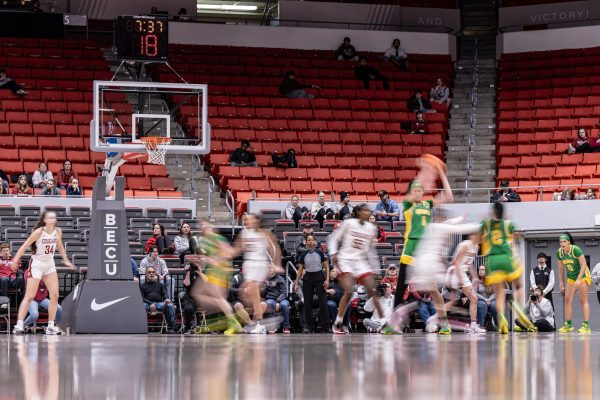ASWSU senator, former IFC president call for student feedback in conduct process
November 4, 2016
When WSU President Kirk Schulz began his tenure in June, his first public action was condemning the university’s overspending and lack of financial oversight. He created a plan and guaranteed to put WSU back on track financially.
When it comes to conduct, though, students simply receive an email saying that the university is confident in the process but perhaps there is room for improvement. Where is that same zeal for institutional reform?
We are students. We are biased. When fellow students or groups bring forward concerns with a process or system that needs to be addressed, we stand by our Cougs and work to find solutions.
The current student conduct process is a system surrounded by concern — from students, parents, and the community. The WSU Conduct Board mission states that the board seeks to, “involve students in the conduct process, recognizing their rights and responsibilities and fostering self-determination and transformational engagement.”
If we truly strive to engage with one another in a transformational way, we must advocate for an open, honest conversation regarding issues with the process and tangible solutions for improvement.
Our issues with the conduct system, as students ourselves, stem from its inconsistency in punishment and a clear lack of emphasis on education. An education at WSU, according to the school’s mission statement, is one “in which students and emerging scholars are mentored to realize their highest potential and assume roles of leadership, responsibility and service to society.”
If we want, as a community and university, to ensure that every student is afforded an ability to repent, learn and have another shot, we must work to provide educational opportunities. Indeed, Melynda Huskey, WSU’s Interim Vice President of Student Affairs, said it best herself in the Seattle Times on October 27: “Our goal is to provide educational intervention for students that’s developmental and supportive. Many things that would be appropriate and suitable in court wouldn’t be suitable for an educational hearing.”
Huskey continued to say that the university conduct board did not “need to wait until the criminal process is resolved,” and that students could be found responsible for violating the standards of conduct while not being found guilty of committing a crime.
How, then, could a case like Robert Barber’s be justified?
Sure, we’re both avid Cougar football fans and of course we would love to see him be able to play. But if student conduct has found him guilty of his accusations and deemed his suspension from the team as a just punishment, we can understand the means that led to that result. Suspending him as a student, though? How does removing this man’s education entirely fall in line with WSU’s claim of developing students through education?
It is unfortunate that it took this singular case to highlight issues in a system that numerous other students have experienced. It is important, though, that we use this attention to bring to light our concerns of the entire process and its lack of consistency.
Those who are accused of violating WSU’s Code of Conduct are subjected to a system whose board makes decisions based on perception and interpretation rather than precedent. While we understand the need to address students on a case-by-case basis, it is imperative that the board acknowledges the possibility for implicit bias when dealing with cases which may lead to inconsistency in punishment. Setting precedents for like-punishments ensures a priority of consistency and, hopefully, punishments that are constantly educating students dealing with similar problems.
The Conduct Board should be actively pursuing feedback from students, especially those who have gone through the process, on the impact of their experience with the board and the long-term implications of their punishments, and if there are ways that they could have been better educated.
Without this feedback, how can the Student Conduct process continue to transform to ensure that decisions made are equitable and educational for everyone?
They can’t.
Kevin Schilling is an ASWSU arts and sciences senator and Zak Cherif is the former Interfraternity Council president.


















